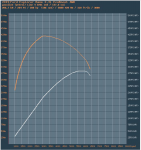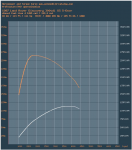DieselRanger
Well-known member
So shouldn't it have been cheaper than the 2018 version? or the 1979 version?I wasn't referring to pricing by bringing up the Benz. Just how similar the 2019 redesign was to the old 2018 version.
So shouldn't it have been cheaper than the 2018 version? or the 1979 version?I wasn't referring to pricing by bringing up the Benz. Just how similar the 2019 redesign was to the old 2018 version.
Agree on the diesel - off-roading in the D5 Td6 is effortless, especially above 10,000 feet on a 15+ degree rock garden. It just goes.But the biggest single advantage is driving a diesel off-road that low speed torque just makes everything so much easier. I just stick my D-90 in low range, center diff locked, select which gear I want for ground speed (usually second) and sit back and steer.
The torque right off idle just lets you crawl along and steer around the obstacles. I'm always amazed at just how right Land Rover got the gear ratios on a 300 Tdi Defender 90. It seems that there is a perfect gear for each terrain.
It will do 70 on the high end and its admittedly happier at 60-65 but off road its just magic.
But - it appears that we may not get the opportunity to find out - Land Rover is rumored to NOT be bringing the diesel Defender to the United States - news that greatly upsets this life long Land Rover enthusiast.
Sorry, I'm not following...So shouldn't it have been cheaper than the 2018 version? or the 1979 version?
Highway mileage on my diesel D5 at around 70 mph is averaging right around 28.5-30 mpg - best on one tank was 30.81 mpg back in May of this year - with a lot of mileage results around 29 mpg on our multiple trips to upstate New York or Florida.
Towing a 2700 lb travel trailer back from Orlando to Atlanta we got around 20 mpg (at 70 mph) and my around town mileage averages 19-21 mpg in daily driving. I would expect the Defender to get better than that.
The big advantage of the diesel is that the torque peak comes in at a much lower rpm - when you are cruising at 1700 rpm at 70 mph and come up on some slower traffic, acceleration is definitely better with the diesel when you roll on the throttle..........
So you realize the $12K isn't just for the engine, right? It bumps you up to the SE which carries a number of other additions. I do wish they'd build perfectly to order but no automaker does that for the US market aside from the ultra high-end marques.
So do you want it easy to maintain or reliable? They did make it lighter and stronger, but to do that you can't make it cheaper - that's the tradeoff because manufacturing processes and materials to make it lighter and stronger are inherently more expensive. My Td6 I can change the oil by vacuuming it out - no lift required, takes 15 minutes. No spark plugs to change, no glow plugs to change - it's electronic. I haven't owned a vehicle where the AC compressor or alternator failed -- I think ever, and that's after over 100K miles on most of my vehicles, one which was heavily off-roaded and driven hard on-road, two of them I lived in Vegas at the time AND off-roaded one. Cables break, linkages on manual actuators fail. Never had or seen a backup cam fail on any vehicle.I hear this poorly thought out argument a lot.
No is the answer.
Make a Defender. Update it with current materials, modern design, engineering, and manufacturing standards. (cheaper, lighter, stronger, etc). Use a proven, time tested, reliable engine and trans combo. No turbo or hybrid or the need to harvest energy when slowing down. We want easy to maintain and reliable with this model. Put the AC compressor and alternator up top. Give it a manual T case with 4.1 gear set. Cable lockers. Mechanical steering and a throttle cable. Put a separate screen in for the backup cam to appease the safety nazis, so when it quits working, it can be taken out or easily replaced. Removable top and doors. No vehicle is perfect, but slapping a bunch of tech onto a vehicle designed for rugged off road use is not a good recipe.
What we have here is JLR over complicating a proven truck that shares nothing with a 'Defender' except for a flat rear door.
If you never change it, it should be cheaper to manufacture in the long run.Sorry, I'm not following...
Oh I hear ya, I was placating the other poster. I wasn't going to bring up the aircraft since they are built to a different standard....but agree, it's relevant. The argument folks have against the "wire" control interface is somewhat valid from a field repair / serviceability perspective, aka, it's not possible.Electronic braking systems, steering systems, and throttles have fewer moving parts and fewer failure points. And literally millions of road miles on them across the industry. In fact, these control systems were first developed for fighter jets in the 1970s because the control surfaces were engineered so precisely that computers were required to keep them trimmed - humans couldn't do it, but they enabled far higher performance than hydraulics and cables had in generations prior. It's the ultimate trickle-down technology.
A claim of 40 mpg is highly suspect.....but would expect it to be more than the current diesels with all the emissions equip....but 40, not a chance unless he's hyper-mileing or unique driving situation....For reference my son has a 85 RRC with Isuzu 4cyl tdi diesel swapped in. He gets ............. 40mpg.
Not always true - my ranger with the 2.3 EB, which puts out very sim numbers to the 2.0 P300 is in the mid 1000's for RPM's, where it makes plenty of torque, more than many diesels of yesterday and MUCH more than a 300 TDI that somebody else mentioned. Diesels definitely have better response down low but it's a misconception, relative to some of the newer turbo engines, that diesels are always "torquier". I realize I am comparing a newer gas to an older diesel...but I suppose my point is, old defender had a good reputation for offroading due to it's "torque", we have every reason to believe the new one will have just as much torque (or more) at a low RPM.It's all about the torque curve. While you cruising at 1700 rpm at 70mph the gas versions are in the low 2K's and not up on the torque curve. Add weight and they have to move to higher rpm's and fuel consumption. Wouldn't be surprised to read that the P400 MHEV that gave 16mpg drops to 13/14 mpg or less. Which is why the 2.0L is likely not an option for towing at altitude.


I've never understood this. I've never, in all my years over multiple vehicles, Toyota trucks, Dodge pickups, full size Chevy trucks, Land Cruiers, etc, felt the need for more power down low when in low range with any of my gas vehicles. They have plenty to break axles and tear up drivelines as is. The diesels definitely have a different "feel" to them, more direct and more connected, but wouldn't necessarily call that an advantage.Highway mileage on my diesel D5 at around 70 mph is averaging right around 28.5-30 mpg - best on one tank was 30.81 mpg back in May of this year - with a lot of mileage results around 29 mpg on our multiple trips to upstate New York or Florida.
Towing a 2700 lb travel trailer back from Orlando to Atlanta we got around 20 mpg (at 70 mph) and my around town mileage averages 19-21 mpg in daily driving. I would expect the Defender to get better than that.
The big advantage of the diesel is that the torque peak comes in at a much lower rpm - when you are cruising at 1700 rpm at 70 mph and come up on some slower traffic, acceleration is definitely better with the diesel when you roll on the throttle.
Another is range - my diesel Defender 90 has a usable range of over 300 miles on the highway - almost double what an NAS Defender can do on the same 14 gallon tank.
But the biggest single advantage is driving a diesel off-road that low speed torque just makes everything so much easier. I just stick my D-90 in low range, center diff locked, select which gear I want for ground speed (usually second) and sit back and steer.
The torque right off idle just lets you crawl along and steer around the obstacles. I'm always amazed at just how right Land Rover got the gear ratios on a 300 Tdi Defender 90. It seems that there is a perfect gear for each terrain.
It will do 70 on the high end and its admittedly happier at 60-65 but off road its just magic.
But - it appears that we may not get the opportunity to find out - Land Rover is rumored to NOT be bringing the diesel Defender to the United States - news that greatly upsets this life long Land Rover enthusiast.
Those folks fail to realize that of the wires don't break because they're in a loom that's wrapped and never move, they don't need to be field repairable / serviceable.The argument folks have against the "wire" control interface is somewhat valid from a field repair / serviceability perspective, aka, it's not possible.
Those folks fail to realize that of the wires don't break because they're in a loom that's wrapped and never move, they don't need to be field repairable / serviceable.
